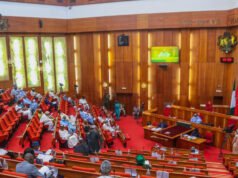In a country brimming with intelligent and hardworking young people, a silent crisis is threatening to derail Nigeria’s future workforce — the absence of a structured and functional career guidance system. Educationists, policy experts, and concerned citizens are now calling for the establishment of a National Youth Career Development Initiative to equip students with the skills, clarity, and direction needed to thrive in a competitive, fast-changing job market.
While many Nigerian students aspire to graduate with honours, their career journeys often stop at securing a degree or certificate. Few have a well-defined career development plan. The majority are caught in a cycle of pursuing higher education purely for the sake of formal qualification, without a strategic pathway to professional fulfilment.
The challenge is compounded by two realities:
- Job scarcity – Employment opportunities remain limited, and no government anywhere can guarantee jobs for all citizens.
- Narrow career focus – Not every young Nigerian needs to follow the traditional university route; many would excel through vocational or technical skills training.
Industry experts say Nigeria urgently needs to embrace alternative career pathways that can produce competent professionals in high-demand sectors such as electrical work, carpentry, plumbing, welding, automotive mechanics, and computer technology.
“These are not fallback options — they are strategic skills that can drive the economy and foster entrepreneurship,” says Dr. Funmilayo Adebayo, an education consultant based in Abuja.
Table of Contents

The Missing Link: Career Counselling
At the heart of the problem is the near-total absence of structured career counselling in Nigerian schools.
Historically, Nigeria’s education system, inherited from colonial times, was designed to produce clerks, administrators, and civil servants. It had little to do with helping young people discover their strengths, interests, or unique career potential.
Even after the introduction of guidance and counselling in the 1977 National Policy on Education — revised in 2013 — the implementation has been patchy at best.
According to the Institute of Counselling in Nigeria (2020), only 15% of secondary schools have functional counselling units, and many are staffed by teachers without professional counselling training. This gap has created what analysts describe as a generation of aimless graduates — individuals armed with certificates but lacking direction, employable skills, or adaptability to real-world demands.
The Economic and Social Costs
The cost of this systemic failure is staggering.
The World Bank estimates that youth unemployment drains billions of naira in potential GDP every year. Beyond lost productivity, the psychological impact is severe.
A 2021 University of Ibadan study linked career indecision among students to anxiety, low self-esteem, and depression. Many young people stuck in unsuitable career paths reported experiencing mental health struggles, leading to broader social consequences.
Crime is another by-product. Nigeria’s crime index score of 7.28/10 globally has been partly attributed to unemployed and underemployed youth drifting into cultism, cybercrime, extremism, and other illicit activities.

Global Lessons Nigeria Can Learn
Countries that have successfully addressed youth career uncertainty provide useful models for Nigeria’s policymakers:
- Finland – Career guidance is embedded in the school curriculum from an early stage. Trained counsellors work with students to identify strengths, interests, and suitable career paths.
- Singapore – The Education and Career Guidance (ECG) programme aligns student aspirations with workforce needs. This has helped keep youth unemployment below 5%.
- Australia – The National Career Education Strategy integrates career development into the school system, focusing on transferable skills such as problem-solving, adaptability, and critical thinking.
Tinubu’s Renewed Hope Agenda — A Starting Point
President Bola Tinubu’s administration has shown interest in improving youth employability through the Nigeria Education Loan Fund and plans to revitalise technical and vocational colleges. However, experts warn that these efforts could fall short if they are not paired with a robust, nationwide career guidance system.
“If you’re building schools but not showing students where those roads can lead, you’re setting them up for frustration,” notes Dr. Tunde Oladipo, a youth empowerment advocate.
A Call for a National Youth Career Development Initiative
Stakeholders believe the solution lies in creating a National Youth Career Development Initiative — a comprehensive programme that would:
- Integrate career counselling into all levels of education – from primary schools to universities.
- Deploy trained and certified career guidance professionals to every school.
- Develop skill maps for Nigeria’s labour market, highlighting sectors with high growth potential.
- Promote vocational and technical training as equally prestigious career options.
- Leverage technology to provide virtual career guidance platforms, particularly for rural areas.
The Role of Leadership
To avoid the bureaucratic delays that often stall government projects, some experts suggest the appointment of a Special Adviser to the President on National Youth Career Development.
This adviser, they argue, should be:
- An innovative thinker
- A visionary leader
- Empathetic towards youth challenges
- Deeply knowledgeable about Nigeria’s labour market
- Passionate about empowering young people
Such a position would ensure that the initiative is driven by results, not paperwork.
What This Means for Nigeria’s Future
If implemented, a National Youth Career Development Initiative could help reverse decades of mismatch between education and employment needs. It could produce a generation of young Nigerians who not only hold certificates but also possess the skills, confidence, and entrepreneurial mindset to contribute meaningfully to national growth.
The stakes are high. Without urgent action, Nigeria risks losing an entire generation to unemployment, underemployment, and social disillusionment. But with focused leadership and strategic investment, the country could transform its youthful population into a global competitive advantage.

Conclusion
Nigeria stands at a crossroads. The choice is between continuing with an outdated education system that churns out paper-qualified but unprepared graduates — or embracing a forward-looking model that nurtures talent, diversifies career pathways, and aligns education with the realities of the modern economy.
The call for a National Youth Career Development Initiative is not just another policy suggestion. It is a lifeline for millions of young Nigerians whose dreams and potentials are at stake.
“Give the youth the tools, and they will build the future. Deny them direction, and the future will build without them — and possibly without us,” says Dr. Adebayo.
Join Our Social Media Channels:
WhatsApp: NaijaEyes
Facebook: NaijaEyes
Twitter: NaijaEyes
Instagram: NaijaEyes
TikTok: NaijaEyes
READ THE LATEST EDUCATION NEWS





